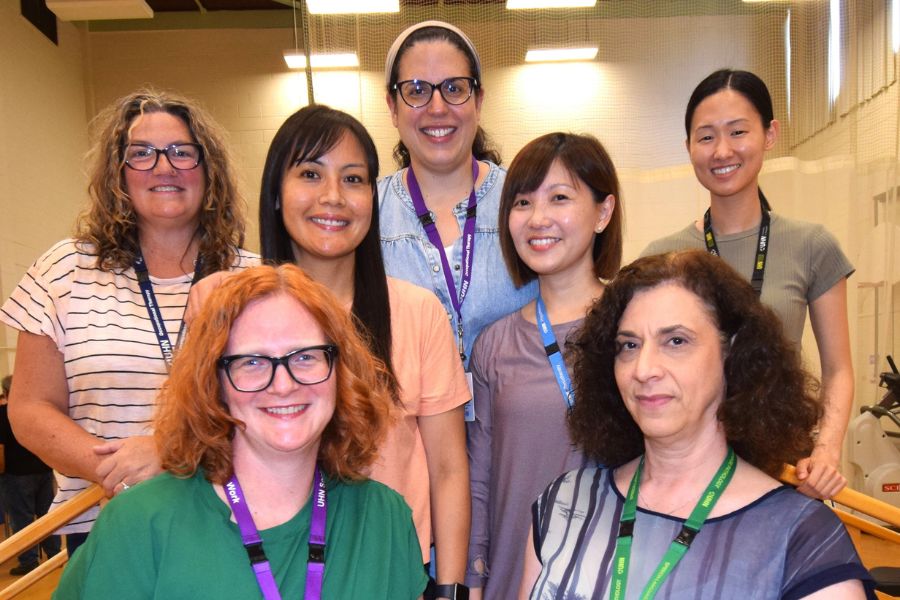Nearly 20 years after completing her PhD in neurodegenerative diseases, University Health Network’s (UHN) Dr. Naomi Visanji still remains fascinated by how the brain works, and is putting her great mind to use as she unravels the processes of Parkinson’s disease (PD). Not only will her research alter the course of treatment for this disease, but her own personal connection – her mother’s diagnosis – is keeping her motivated.
Growing up in the United Kingdom, Dr. Visanji completed her undergraduate degree in Neuroscience, and then went on to pursue a PhD at King’s College London where she narrowed her focus on PD. While her mother would not be diagnosed until years later, Dr. Visanji moved to Canada to continue her research and kick-start her career. Now, she is an established senior researcher at the Edmond J. Safra Program in Parkinson’s Disease and the Morton and Gloria Shulman Movement Disorders Clinic at Toronto Western Hospital, as well as The Rossy Progressive Supranuclear Palsy Centre within the Krembil Brain Institute.
Cracking the code
Among her colleagues, Dr. Visanji is seen as an important bridge between basic scientists and clinical researchers, as her research takes place both in the lab as well as with patients in UHN’s Movement Disorders Clinic. In her unique role, she is studying the biology of the brain, and how the protein alpha-synuclein expresses itself abnormally in those diagnosed with movement disorders. While this protein is commonly found throughout the body, it is highly concentrated in the brain and is believed to be involved in communication processes between nerve cells. In individuals with PD, the molecules of alpha-synuclein change their structure, causing them to stick together and become toxic. This process is thought to contribute to the cell death that underlies the symptoms of PD. These symptoms include debilitating tremors, difficulties with balance and walking, as well as anxiety, depression, sleep disturbances and other disorders. Due to the progressive nature of the disease, PD continually worsens over time, greatly disrupting one’s quality of life.
“Right now, the only way to receive a definitive diagnosis of PD is through a post-mortem analysis of the brain, which is clearly too late,” says Dr. Visanji. “Clinical diagnoses are not always accurate. Many types of movement disorders have overlapping symptoms, especially in the early stages, and it is incredibly frustrating for patients to not have definitive answers and a clear way forward.”
Time is of the essence when trying to make an accurate diagnosis, which is why Dr. Visanji is currently conducting a game-changing clinical biomarker study in collaboration with Drs. Anthony Lang, Gabor G. Kovacs and Ivan Martinez-Valbuena at the Krembil Brain Institute. The team of investigators are examining changes in how alpha-synuclein clumps together in blood, cerebrospinal fluid, saliva and skin biopsies in order to crack the code of diagnosing people with PD as early as possible. Grateful to all the patients who have volunteered so far for this study, Dr. Visanji says they are “absolute heroes for coming to the hospital during the pandemic.” This study is ongoing, and the team is hoping to recruit a total of 80 patients from the Movement Disorders Clinic.
The ultimate goal is to develop a test that can distinguish between different movement disorders, and diagnose people accurately early on. This will play a huge role in helping determine the application of future treatments and medications, and drastically improve the quality of care for patients.
The impact of COVID-19
Despite the promise of Dr. Visanji’s studies, it has not been without hardship. Her lab was one of many to be shut down during the first wave of COVID-19. Recovering from that has been slow. But, she remarks that UHN has been doing an excellent job of putting processes in place to ensure she and her colleagues feel safe in the workplace and that any concerns are heard by hospital leadership.
Finding compassion, strength and hope
While Dr. Visanji’s professional life revolves around PD, it also impacts her on a personal level. Her mother was diagnosed with the disease almost 10 years ago. As surprising and challenging as it has been – especially with the ongoing pandemic and inability to travel home – it has also brought the family closer together.
“My mother’s diagnosis is a continuous reminder that there’s a human side to this,” reflects Dr. Visanji. “As a scientist, so much of what you do doesn’t work out, which is part of the process. Having somebody in your life with the disease you’re studying keeps you motivated and reminds you that there are people relying on you to give them hope.”
Back home in the U.K., her mother’s pride and joy was maintaining a beautiful garden, but gradually that became more challenging as the disease advanced. The enjoyment of eating family meals dwindled as she lost her sense of taste and smell, and pre-pandemic, she became reluctant to hold her infant granddaughter during family visits.
“It’s absolutely heartbreaking,” says Dr. Visanji. “But what gives my mom hope is the idea of a better treatment or a cure in sight – even if it’s not for her, then for someone else. PD has taken so much from her, and she doesn’t want anyone else to have to experience that.”
The message of hope resonates strongly with Dr. Visanji, who offers some advice for those supporting or caring for a loved one with PD.
“Think of PD as being like an iceberg: there’s more to the shakiness and the tremors that you see on the surface. It’s not just a movement disorder,” she says. “It’s important to have that compassion and the awareness that there is a human behind this disease, who has been struggling with other underlying issues for much longer than you may realize.”
To learn more about the Movement Disorders Clinic and the Krembil Brain Institute, click here.


